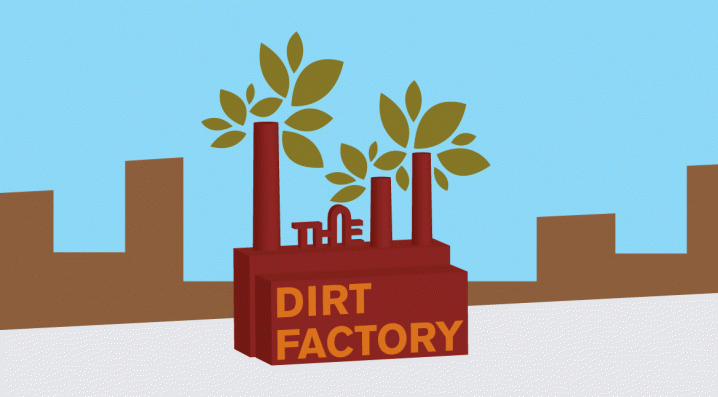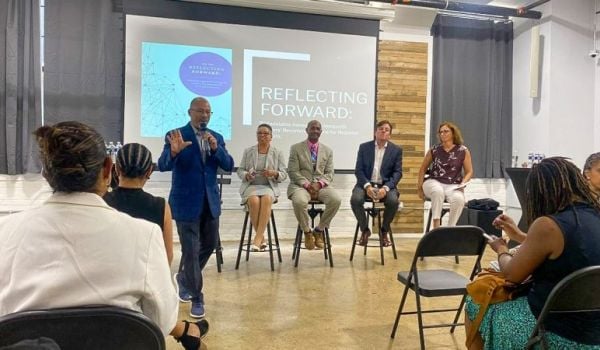Seth Budick points above a mangled barbed-wire fence toward a high-rise public apartment building. He is sitting on a low bench, surrounded by stacks of palettes, debris and two immense composting machines.
“We’ve got these towers here,” he says, “and of course we would love to get them involved. But on the other hand, we are limited.”
As manager of policy and research for the University City District — a business improvement district that encompasses the University of Pennsylvania, Drexel University and Philadelphia’s largest transportation hub, 30th Street Station — Budick is the lead organizer of the soon-to-be-opened composting facility known as The Dirt Factory.
With just two “Earth Tubs” — in-vessel composters made by Green Mountain Technologies and donated by UPenn — and a space no larger than a three-story apartment building, Budick hopes to make The Dirt Factory a successful model for small-scale, centralized composting facilities that will, despite limited space and funding, incline others to follow suit.
Here’s the way it’s supposed to work: One Earth Tub composts while the other is filled with waste collected from the community, creating a cycle that can, if managed properly, maintain a steady output of finished compost for local gardens and an input of organic waste.
But the difficulties in maintaining this kind of consistency are less technical than organizational, according to Budick. “How much pent-up demand for composting is there in the UCD?” He asks. “It is hard to say.” So for the time being, he sees The Dirt Factory as a “pilot project” as well as an opportunity to beautify and lend value to a vacant property.
The lot is being leased to the UCD by owners David P. Wilson, Jr. and Vincent P. DiPentino in a “semi-formal agreement” for an interim period of 3-4 years. While Budick realizes that the property will eventually be developed, both the UCD and the owners want to see the land put to good use in the meantime.

Credit: The Pedal Co-Op
These kinds of informal partnerships have shaped the Dirt Factory from the outset. For example, The Pedal Co-Op — a bicycle hauling service that has already been collecting and composting organic waste across Philadelphia — has the keys to the facility. Budick even makes sure to prioritize them as option when trying to involve local businesses.
Prior to their partnership with the The Dirt Factory, The Pedal Co-Op remained in a constant search for drop-off points. Now, The Dirt Factory is their designated location for West Philadelphia pickups, which include over 40 residences and two businesses.
Amy Wilson, executive director of The Pedal Co-Op, says the relationship has allowed for flexibility in accepting new clients and has also helped develop a relationship with the UPenn.
The broader strategy, according to Budick, is for the UCD is to act as a catalyst for existing and willing participants in the community. Outsourcing is a major facet of this, but not for its own sake. Rather, Budick sums up the UCD’s philosophy as “opportunistic” while understanding of its crucial role in managing the facility’s operations, assuming liability and keeping the physical space “clean and safe.”
Similarly, Lee Mienicke of Philly Compost cites “land and a ‘hosting entity‘” as the most crucial factors to be provided from the top down. Once that much is available, combined with local interested parties, Budick hopes that “demand will grow with capacity.”
And while Budick understands that The Dirt Factory is not the be-all, end-all of composting in Philadelphia, its success could make further projects possible. Currently, says Budick, it is “very likely that at least one additional satellite facility” is in the works.
















